The Film: Sitting Target (1972)
The Principles: Written by Alexander Jacobs. Directed by Douglas Hickox. Acted by Oliver Reed, Jill St. John, Ian McShane, Edward Woodward, and Frank Finlay.
The Premise: Convicted killer Harry Lomart (Reed) is doing time for a botched robbery. During a visit from his wife (St. John), she tells him that she’s carrying another man’s child. Harry’s anger boil over and he vows to kill his two-timing wife and her new boyfriend. With the help of fellow inmate Birdy (McShane), Harry escapes from prison and sets out into the UK underworld, determined to take out any cop or criminal who tries to stop him from wrapping his hands around his wife’s neck.
Is It Good: Hell yes. As far as revenge flicks go, this one is pretty by-the-numbers. However, the buddy-criminal team of Oliver Reed and Ian McShane elevates the film to genre greatness. Our amoral avenger Harry is 200lbs of primal menace. He doesn’t speak much, but his concrete scowl and barrel-chest could punch a hole through a steel wall. How tough is he? He does pushups on the ceiling of his jail cell. On the flip side, Birdy has a silver tongue that more than makes up for Harry’s tight lips . The muscle and the mouth compliment each other nicely.
Although Reed spends nearly the entire film either committing violence or teetering on the verge of it, there are a few subtle moments where his vulnerability peeks out. After his wife Pat drops the bomb on him during her visit to prison, he lies on his cot staring at the ceiling with tears in his eyes. Then he turns on his side, like he doesn’t want the camera to catch him crying. Once he’s out of prison, there are only a couple of scenes where he’s not sharing the screen with Birdy. One of these is when he’s retrieving the stolen loot from the robbery that got him locked up. It’s in the rafters of the London Hippodrome Theater and as Harry is leaving with the bag, he stops on stage and takes a bow before the hundreds of empty seats. It’s a brilliant moment that I interpreted as Harry accepting that this whole violent shit-show isn’t going to end well.
The film unfurls in scene after scene of uncompromising brutality and tension. Whether it’s Harry kicking the shit out of a gun dealer or bombing through back-alleys in a jeep, nearly every scene has some action in it . One particular highlight is when Harry is being chased by some motorcycle cops. He shoots at one and the bike explodes into a ball of flame and continues forward through walls of burning laundry. It’s a fantastic stunt. Great action scenes like this are interlaced with quiet moments of loaded tension. The prison escape is a real ass-clencher, as is the scene in gangster Marty Gold’s palatial fuck pad. While they wait for Gold to get home, Harry takes a bubble bath. Seeing the brawny Oliver Reed sitting in a tub with bubbles all over his grinning face is adorable as well as a nice portrayal of how someone who’s spent a significant time in prison relishes the luxuries civilians take for granted.
Like the best crime films of the ’70s, Sitting Target is one cynical bastard. All of the characters, from the screws to the molls, offer no redeeming qualities. It’s a severely vicious film devoid of any comedic breaks or flash. Razor sharp from beginning to end, it’s essential viewing for anyone who’s into grim crime films or anyone who simply enjoys watching Oliver Reed kick people’s teeth in.
Is It Worth a Look: Duh. It was recently released by the Warner Archive Collection and it’s worth every penny. Buy it from CHUD!
Random Anecdotes: The screenplay was written by legendary British script doctor Alexander Jacobs, based on the novel by Laurence Henderson. Jacobs’ writing credits include some incredible crime flicks: the gritty as hell The Seven-Ups, the terribly underrated French Connection II, and the almighty Point Blank.
When it was released in NYC in June 1972, Sitting Target played as part of a double bill with One Is a Lonely Number, a drama about a woman putting her life back together after her husband leaves her. This baffling pairing of domestic drama and violent revenge film probably had something to do with Sitting Target‘s demise stateside.
“I don’t want gratuitous violence in my film. I want the action to hit the audience fast. I don’t want to show people dying in slow motion because I think that sort of thing slows up the action.” – Douglas Hickox being interview on the set for “Films Illustrated.”
Cinematic Soulmates: Point Blank, Get Carter, The Long Good Friday, Villain, The Big Heat.



